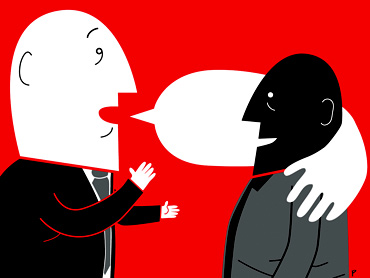Friday, March 26, 2010
Features of Conversation
Turn-taking rules and mitigating expressions appear to exist across cultures, but the ways that speakers realize these tools vary according to culture (and, often, according to gender as well.)Observe your interactions during the next couple of days. How do you (and/or your friends) generally do the following: a.)signal to others that you/your friend is/are finished with a turn, and that it is another person's turn to speak. b.)signal that you/your friend are/is ready to finish a phone call c.)employ pre-request expressions? For this question, it will only be necessary to talk about one of the three linsuistic devices, but choose the one that is the most interesting for you after observing the three in action.
Subscribe to:
Post Comments (Atom)

To indicate that it is my turn and the speaker had better stop to listen to me,
ReplyDeleteI either start to mutter slowly to give the signal of turn-taking or I continuously nod until I jump into the topic to state my opinions. I have realized that I use muttering with the close friends and nodding with Japanese people whose way of communication also includes bowing and nodding. This self-observation supports that signals of turn-taking can change according to the cultures. What’s more, those signals can also change according to the characteristics of the people in the same culture since, in the request of a turn-taking, some of my friends stop eye-contacting, some look bored or ignorant while some others constantly blink.
We use different strategies when we want to take part in a conversation depending on the situation we are. I usally wait that the speaker finishes his speech and takes a deep breath to start speaking or I may interrupt someone if I feel that someone is blaming or accusing me whithout any reason. In a more formal situation I raise hand and ask permission to speak.
ReplyDeletei do agree with sema in terms of turn-taking when i start my conversation, the other should stop and listen to me.otherwise i become annoyed and finish conversation there.the expressions may vary across cultures but the turn-taking situtation i mentioned above should not be changed.when it comes to the examples, i generally employ nodding and eye-contacting while i am listening to others.
ReplyDeleteBetül, 'Nodding and eye-contact' would more correctly be categorized as 'feedback.' Instead, what happens when you are talking and would like to signal to others that they can make a contribution soon? Does the tone of your voice change? Do you repeat what has been said? Do you make a comment to sum things up?
ReplyDeleteWhen I am talking to people and I want them to take the turn to speak and contribute, I generally ask a question such as "So, what do you think about it?" and awaken their interest in the topic. I look directly and curiously into the people's eyes whose answers I wonder most. If I want to take the turn from my friends, I generally say "O değil de, geçen gün şöyle bir şey duydum..." which might actually be rude with strangers. The meaning is "Let's skip u, I heard something interesting..."
ReplyDeleteAnd Turkish has a specific word for such turn-taking situations or for ending phone calls. This word is "Neyse". "Neyse" is a not actually a conjunction, but a filler instead. When u start ur sentence with "Neyse", it makes people think that now u're about to end the discussion or change the topic. It does not have a rude meaning, either.
ReplyDeleteWhen I started to observe people closer , I realised that we use very informal ways when we are among close friends and don't wait politely our turn, but instead we cut the parole, make interventions or just increase our voice. But personaly I always wait the interlocutor to terminate his speech and I wait the same respect from them.( Most people like to speak but don't like to listen). When I'm on phone I make clear that I have nothing more to say and say goodby whithout hesitation.
ReplyDeleteWhen I started to observe people closer , I realised that we use very informal ways when we are among close friends and don't wait politely our turn, but instead we cut the parole, make interventions or just increase our voice. But personaly I always wait the interlocutor to terminate his speech and I wait the same respect from them.( Most people like to speak but don't like to listen). When I'm on phone I make clear that I have nothing more to say and say goodby whithout hesitation.
ReplyDelete